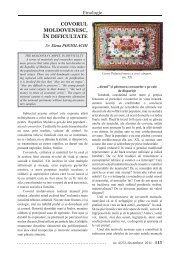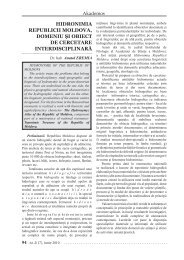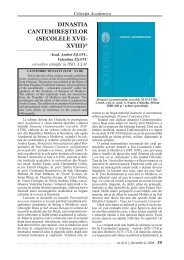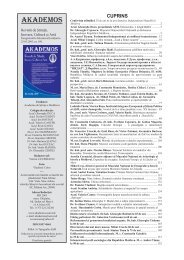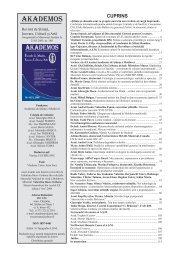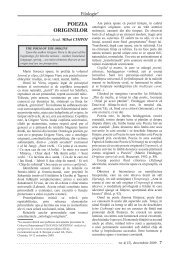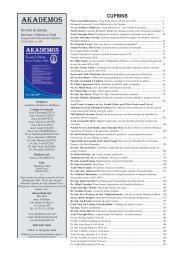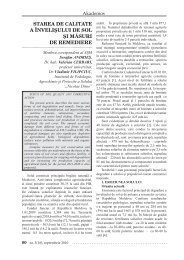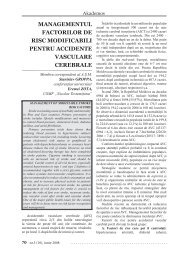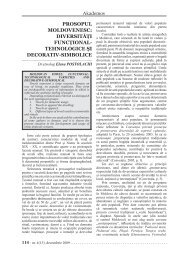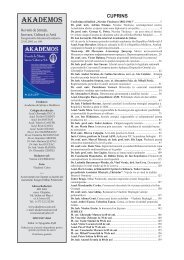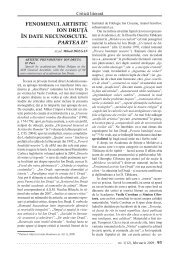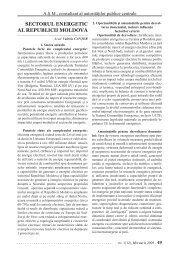Academos 3 2008.indd - Akademos - Academia de ÅtiinÅ£e a Moldovei
Academos 3 2008.indd - Akademos - Academia de ÅtiinÅ£e a Moldovei
Academos 3 2008.indd - Akademos - Academia de ÅtiinÅ£e a Moldovei
You also want an ePaper? Increase the reach of your titles
YUMPU automatically turns print PDFs into web optimized ePapers that Google loves.
Etatea Repere în literatura şi obiective universală<br />
But make a good girl, please.’<br />
The days and nights went by her<br />
Like waves round a Cornish wreck;<br />
She bicycled down to the doctor<br />
With her clothes buttoned up to the neck.<br />
She bicycled down to the doctor,<br />
And rang the surgery bell;<br />
‘O, doctor, I’ve a pain insi<strong>de</strong> me,<br />
And I don’t feel very well.’<br />
Doctor Thomas looked her over,<br />
And then he looked some more;<br />
Walked over to his wash-basin,<br />
Said, ‘Why didn’t you come before?’<br />
Doctor Thomas sat over his dinner,<br />
Though his wife was waiting to ring,<br />
Rolling his bread into pellets;<br />
Said, ‘Cancer’s a funny thing.’<br />
Nobody knows what the cause is,<br />
Though some pretend they do;<br />
It’s like some hid<strong>de</strong>n assassin<br />
Waiting to strike at you.<br />
Childless women get it,<br />
And men when they retire;<br />
It’s as if there had to be some outlet<br />
For their foiled creative fire.’<br />
His wife rang for the servant,<br />
Said, ‘Don’t be so morbid, <strong>de</strong>ar’;<br />
He said: ,I saw Miss Gee this evening<br />
And she’s a goner, I fear.’”<br />
3.<br />
Trying to present and analyse a few reflections<br />
on time and ageing in “Belles letters”, we find again<br />
and again that literature is the memory of mankind,<br />
and that in great books we may “not only meet an<br />
author but a man…” (Pascal). “Experience is an<br />
excellent teacher but it sends terrific bills” (Minna<br />
Autrim). Books are more: the may become friends,<br />
and poets may go with us as guiding fellow-travellers<br />
through the transparent or foggy landscape of our<br />
advanced years. Will these years turn into an “Indian<br />
Summer”, a “gol<strong>de</strong>n October”, a period of serenity?<br />
Or is it the nightfall of senility that expects us?<br />
In his Hälfte <strong>de</strong>s Lebens, “Halfway House on<br />
Life’s Road”, Höl<strong>de</strong>rlin anticipated this horror<br />
of winter as anxiety after a mild autumn – an<br />
anticipation of old age:<br />
“Woe is me – where do I pluck<br />
In hoarfrost and winter the flowers,<br />
And where do I find sunshine<br />
And the quiet shadow of the earth.<br />
The walls stand frozen and speechless<br />
And the icy winds shake the weathervanes.”<br />
“Im Win<strong>de</strong> klirren die Fahnen…” – How can<br />
we – with “the stammering eloquence” (O’Neill)<br />
of our mortality ever “snatch the eternal out of<br />
the <strong>de</strong>sperately fleeting” (Williams)? How can we<br />
verbalize our “hopeless hope” (O’Neill), longing in<br />
vain for the “ever” on the boundary to the “never”?<br />
How can we find verbal “ex-pression” for the “<strong>de</strong>pressions”,<br />
the amnesia, the <strong>de</strong>cay, the <strong>de</strong>mentia of<br />
old age?<br />
It is the poets in<strong>de</strong>ed that have tried again<br />
and again to corroborate and at the same time<br />
to sublimate the old word by Seneca: “Senectus<br />
insanabilis morbus est…” May I offer a free<br />
translation? – “The only way to live long is to carry<br />
the bur<strong>de</strong>n of growing old.” And now let me begin<br />
with a few impressions and episo<strong>de</strong>s on longevity<br />
and prolongevity into immortality!<br />
4.<br />
Ladies and Gentlemen!<br />
In Shaw’s preface to The Doctor’s Dilemma<br />
(1911) I read: “Do not try to live forever. You will<br />
not succeed.” Quite a few have tried, and I have<br />
selected three mo<strong>de</strong>ls of mythological and literary<br />
interpretation of man’s always frustrated ambition<br />
not only for longevity but for an ageless and<br />
eternal life – (Denn je<strong>de</strong> Lust will … Ewigkeit…”<br />
[Nietzsche]), Tennyson’s Tithonus, T. S. Eliot’s<br />
“mo<strong>de</strong>rn” Tiresias, Swift’s nightmare of the<br />
immortal Struldbrugs in Gulliver’s Travels.<br />
Eos, the god<strong>de</strong>ss of rosy dawn, falls in love with<br />
beautiful young Tithonus. Asking Zeus to grant him<br />
eternal life, she forgets to beg for his eternal youth.<br />
So his eternal life must turn into eternal ageing<br />
and <strong>de</strong>cay, and in Tennyson’s poem he asks for the<br />
mercy of being allowed to return to mortality and to<br />
find peace in the quiet process of recycling before<br />
he wilts and wilts down to the very shape of a cicada<br />
on the cold outer fringe of the universe:<br />
“The woods <strong>de</strong>cay, the woods <strong>de</strong>cay and fall,<br />
The vapours weep their burthen to the ground,<br />
Man comes and tills the field and lies beneath,<br />
And after many a summer dies the swan.<br />
Me only cruel immortality<br />
Consumes…<br />
Alas! For this grey shadow once a man –<br />
So glorious in his beauty and thy choice,<br />
Who ma<strong>de</strong>st him thy chosen, that he seemed<br />
To his great heart none other than a God!…<br />
But thy strong Hours indignant worked their wills,<br />
And beat me down and marred and wasted me,<br />
And though they could not end me, left me maimed<br />
To dwell in presence of immortal youth,<br />
Immortal age besi<strong>de</strong> immortal youth,<br />
And all I was, in ashes…”.<br />
nr.3 (10), iunie 2008 - 15



